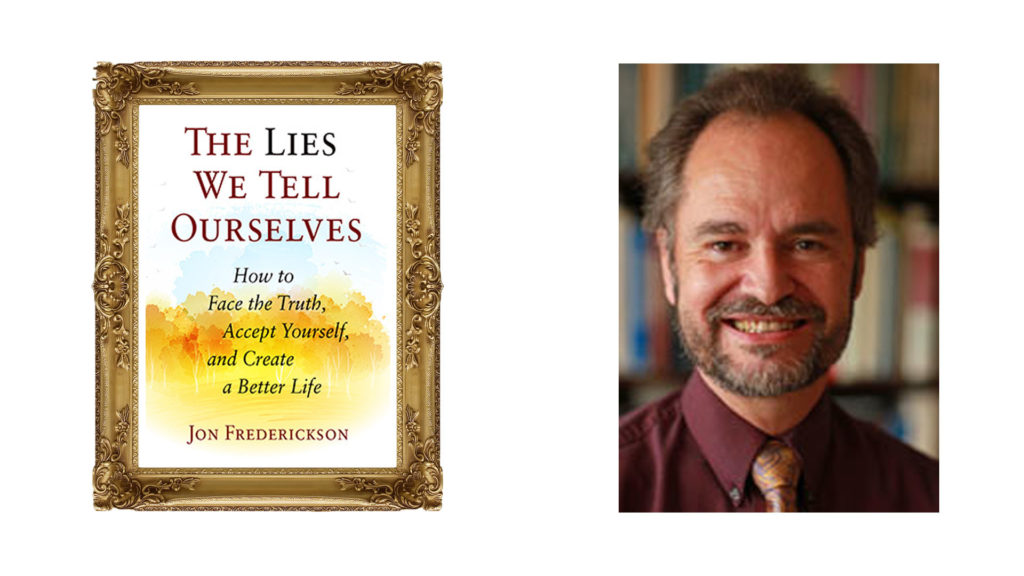
In THE LIES WE TELL OURSELVES: How to Face the Truth, Accept Yourself, and Create a Better Life (Seven Leaves Press; January 2017; $15.95 trade paper; ISBN: 978-0-9883788-8-9), Frederickson shows how acknowledging and owning the painful and shameful facts of our life leads to genuine change and profound peace. And the surest route is through collaboration with the right, wise and caring therapist.
Drawing on decades of working with people in pain and in denial, Frederickson uses real-life stories to reveal truths we all struggle to face and the universal ways we avoid those truths. He discusses:
• Why no one needs to be fixed. “We may think we need to fix ourselves,” Frederickson observes, “but often we are trying to fix our fantasies instead, the broken illusions, shattered self-images, and distorted ideas creating our suffering.”
• Why grief, shame, guilt, and rage are not problems to be avoided but signs of our true self and paths to healing. “We are never hurt by our deepest feelings,” Frederickson assures, “only by our resistance to them.”
• Why taking responsibility for the life we created is so much harder than blaming others for our disappointments and failures, and how therapy can help us break free of trying to force people to live up to our fantasies and fulfill seductive promises and much more.
• How what is “wrong” in us often points to what is right. To heal, recover who we are, and create a more authentic life, we need to stop running and embrace what we fear—from the wounds of our past to our own simmering anger.
Focusing on the heart and soul of therapy, THE LIES WE TELL OURSELVES is an eye-opening guide to not only getting the most from our relationship with a therapist but also our relationships with others—even those who have hurt us—and, above all, with ourselves.
ABOUT THE AUTHOR
JON FREDERICKSON grew up working in his father’s blacksmith shop in Clear Lake, Iowa. At the urging of a music teacher, he attended college and became a professional musician, playing the French horn. After receiving the help of a therapist, he decided to become one. He later found his true calling as an educator, serving on the faculty of the Washington School of Psychiatry, where he taught psychiatrists, psychologists, and social workers. He currently teaches mental health professionals around the world. He is the author of two professional books and dozens of articles on psychotherapy. His previous book for therapists was the award winning Co-Creating Change: Effective Dynamic Therapy Techniques.
Q&A with Jon Frederickson
author of
The Lies We Tell Ourselves: How to Face the Truth,
Accept Yourself, and Create a Better Life
1. What is the ideal relationship between a therapist and a patient?
Patients become ill because they avoid what makes them anxious, and their avoidance strategies create their symptoms and problems. Ideally, the therapist and patient figure out what the patient is avoiding and work hard to face it together.
2. Research has found therapy to be generally effective, yet 50 percent of patients relapse. How do people know whether therapy is right for them?
We can’t know in advance if therapy with a particular therapist will work. We can only decide to work with a therapist and see if together we can co-create a relationship that leads to change. If that doesn’t work, we should try a different therapist in case that’s the problem. And then we should look within ourselves to see if something we are doing is getting in the way of a successful therapeutic relationship.
3. What is the main variable in whether therapy works?
Research shows that the main variable is the patient. After all, when we go into therapy, we need to face what we usually avoid. But this can be difficult since facing what we usually avoid makes us anxious. If we can muster the courage to face what we fear, we should have a good result in therapy.
4. What are the most important steps a patient can take to have an effective therapy?
First of all, be clear about the problem you want to focus on in therapy. If something you usually avoid makes you anxious in therapy, focus on it. When we avoid what makes us anxious, anxiety remains in charge. If we face what makes us anxious, we can take charge.
5. Why is it important to focus on an internal problem you have during therapy rather than focus on other people’s problems?
A therapist can’t do therapy with someone who isn’t in the office. But the therapist can help you with a problem you have. We often try to change other people to end our problems, but it never works. What we can do is change ourselves. And that’s what the therapist can help you with.
6. People tend to avoid the hard truths of their lives. Why is confronting painful truths such a crucial part of therapy and the healing process?
We become ill because we avoid the truths of our lives. For instance, an abused woman denies t

